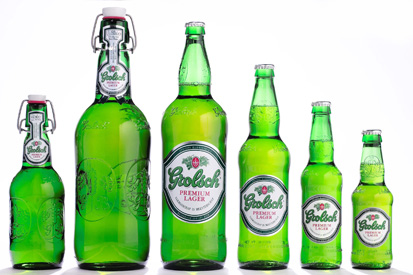Instead, the brewer has been doggedly prepared to continue taking what it called 'the short-term hits' on sales of Grolsch by eschewing promotions at a time when rival premium lagers have been upscaling such activity. Indeed, Molson Coors said it would still market and price Grolsch as a premium product to ensure that the category would become 'sustainable', while describing the discounting of its rivals as 'bonkers'.
It's a brave move, but, although the 24% sales decline appeared to be a marked improvement on March, when sales fell 40%, there are questions over whose sanity should be in question.
More fundamentally, some observers have questioned whether the 'complex' flavour of Grolsch is as accessible to British drinkers as rival brands. Some also claim Grolsch has been neglected by its owners, which bought the brand from SABMiller in 2007: since then, it has received little advertising support.
Long gone is the time when Grolsch was the epitome of cool, and Molson Coors is risking much by positioning it as an expensive world beer. Is it a wise strategy? We asked Richard Huntington, director of strategy at Saatchi & Saatchi, who has worked on Carlsberg, and Hugh Robertson, chief executive and co-founder of RPM, which works with Strongbow and Diageo.
Richard Huntington, director of strategy, Saatchi & SaatchiDear old Grolsch. I think I genuinely haven't thought about this brand, let alone drunk it, for at least 20 years - and if I have, then it was clearly not a particularly well-branded experience.
Back then, in the heady late 80s, it was a hugely fashionable drink precisely because of its distinctive 'beugel' bottle - the one with the swing top. It was exactly the prop that posing in bars, having got yourself your first poorly paid job in advertising, required.
As I remember, it was superseded by the next craze, which was stuffing lime wedges into the neck of dodgy bottled beer to perk it up a bit. Talk about off the radar - you would now have a tough job picking up this brand with the Hubble Space Telescope.
If Grolsch hasn't already given up, I would say that it needs to achieve two things, and fast. It needs presence, not just in the trade and behind the bar, but also in our minds, and that takes investment. Second, while there is plenty of residual love and affection for the brand, it is in desperate need of some brewing respect.
REMEDY
- Create respect using the brand's provenance - or its micro-provenance, to be specific - and that means Amsterdam. The Netherlands is as dull as dyke-water, but Amsterdam is hot.
- Avoid the cliches of prostitution and drugs: the spirit of Amsterdam is free-thinking. There is a Dutch phrase, 'lekker eigenwijs', that effectively means 'go your own way'. This might be a rather interesting place to start.
- Remember that the classic swing-top bottle is evidence of this spirit. It should be used as part of the brand's visual language, much like Coke does with its bottle.
HUGH ROBERTSON, CHIEF EXECUTIVE AND CO-FOUNDER, RPM
In a cluttered market, and given the challenges alcohol brands face, from falling sales in the on-trade, to legislation on sponsorship and advertising and retail pressure to discount, Grolsch is far from alone in the 'sales slump' arena.
The decision to stick to its premium branding has been heavily debated, and may have cost it precious sales during the recession. That said, it also puts it in a much stronger position than some brands that will struggle to regain brand equity after discounting for so long.
There is little understanding in the market of context for the new strapline 'Taste: Amplified', and the most recent campaign, 'Little White Lies', is yet to make a lasting impact. This is part of the problem for Grolsch - the brand needs to achieve a point of difference.
Be it by playing upon brand heritage (eg Kronenbourg), a unique serving ritual (Guinness) or even a specific brand occasion (Smirnoff), gaining ownership of its brand territory is vital in driving consumer recognition, increasing trial and sales and establishing loyalty.
REMEDY
- Consider less conventional marketing methods, such as experiential, ambient and social media, to target specific consumers and groups. This will offer a more targeted means of reiterating the message while driving deeper brand engagement.
- Integrate digital effectively as part of this activity to enable further brand engagement. This provides the invaluable opportunity to develop relationships with consumers.
- Run extra activity such as product sampling, particularly outdoor and on-trade, where there is greater freedom to educate consumers with a fuller and more controlled brand experience.


